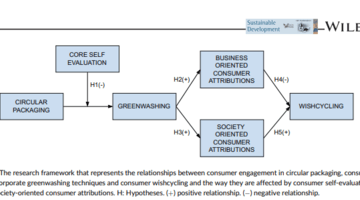A consumer attributions‐based approach for investigating the effect of corporate greenwashing on wishcycling
This paper addresses the issue of corporate greenwashing and its impact on consumer behavior, specifically in the context of circular food and beverage packaging. It consisted of a survey with 537 participants and utilized Structural Equation Modeling to analyze the relationships between company motives, consumer attributions, perceptions of greenwashing, and wishcycling behavior.
Additionally, it explores the moderating effect of core self-evaluation on the relationship between circular packaging and greenwashing techniques. Our findings highlight the mediating role of consumer perceptions of company motives in the relationship between corporate greenwashing and wishcycling. It also finds that consumer personality traits, particularly core self-evaluation, moderate the relationship between circular packaging and perceptions of greenwashing.
These results emphasize the importance of understanding consumer behavior and perceptions in circular environments and policy domains. The findings provide valuable insights for policymakers, businesses, and researchers seeking to promote sustainable consumption and mitigate environmental harm in the transition toward a more circular economy.

Publication date:
Related Green Deal Priorities
Related multimedia


CONTACT
For further details please contact co-leads Professor Chris Foulds (chris.foulds@aru.ac.uk) and Professor Rosie Robison (rosie.robison@aru.ac.uk).

This project has received funding from the European Union’s Horizon 2020 research and innovation program under grant agreement No 101036640. The sole responsibility for the content of this website lies with the SHARED GREEN DEAL HAS project and does not necessarily reflect the opinion of the European Union.